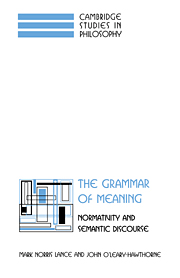Book contents
- Frontmatter
- Contents
- Acknowledgments
- Introduction
- PART I THE PLACE OF MEANING TALK IN SOCIO-LINGUISTIC PRACTICE
- 1 The ends and means of translation: critical reflections on Quine's indeterminacy of translation thesis
- 2 Synonymy, analyticity, and a priori authority
- 3 Where do we go from here?: a pragmatist account of normative judgment
- PART II NATURALISM AND MEANING TALK
- Bibliography
- Index
3 - Where do we go from here?: a pragmatist account of normative judgment
Published online by Cambridge University Press: 05 December 2011
- Frontmatter
- Contents
- Acknowledgments
- Introduction
- PART I THE PLACE OF MEANING TALK IN SOCIO-LINGUISTIC PRACTICE
- 1 The ends and means of translation: critical reflections on Quine's indeterminacy of translation thesis
- 2 Synonymy, analyticity, and a priori authority
- 3 Where do we go from here?: a pragmatist account of normative judgment
- PART II NATURALISM AND MEANING TALK
- Bibliography
- Index
Summary
These [roughly the subjectivity of moral demands and the purported objectivity of moral requirements] are oppositions which have not been invented at all by the subtlety of reflection or the pedantry of philosophy; in numerous forms they have always preoccupied and troubled human consciousness, even if it is modern cultivation that has first worked them out most sharply and driven them up the peak of harshest contradiction. Spiritual culture, the modern understanding, produces this opposition in man which makes him an amphibious animal, because he now has to live in two worlds which contradict one another. The result is that now consciousness wanders in one or the other. … But for modern culture and its understanding this discordance in life and consciousness involves the demand that such a contradiction be resolved. … If general culture has run into such a contradiction, it becomes the task of philosophy to sublate the oppositions, i.e. to show that neither the one alternative in its abstraction, nor the other in the like one-sidedness, possesses truth, but that they are both self-dissolving; that truth lies only in the reconciliation and mediation of both, and that this mediation is no mere demand, but what is in and for itself accomplished and is ever self-accomplishing.
G. W. F. Hegel, Aesthetics: Lectures on Fine Art- Type
- Chapter
- Information
- The Grammar of MeaningNormativity and Semantic Discourse, pp. 172 - 238Publisher: Cambridge University PressPrint publication year: 1997

